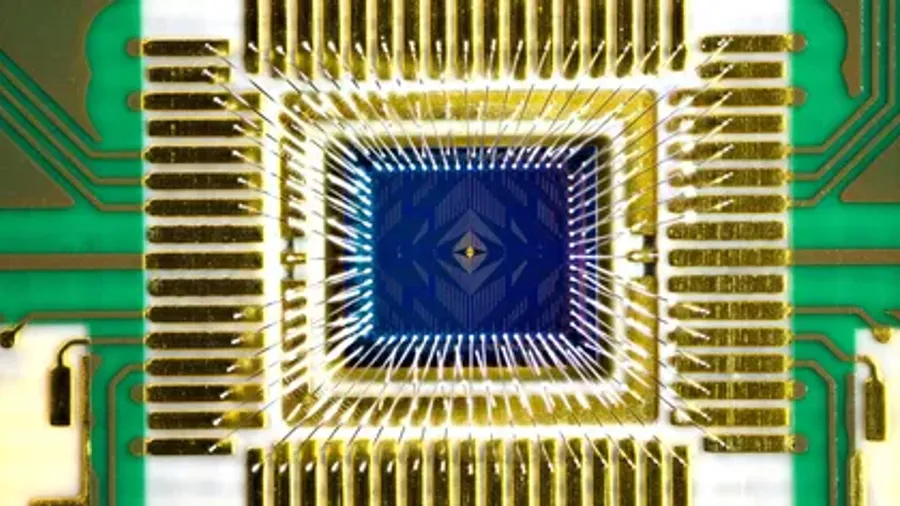· quantum computing · 2 min read
Intel announces Tunnel Falls, its first quantum chip, featuring 12 qubits that use electrons to store data, available to select academic and research partners
Intel has built a quantum processor called Tunnel Falls that it will offer to research labs hoping to make the revolutionary computing technology practical. The Tunnel Falls processor, announced Thursday, houses 12 of the fundamental data processing elements called qubits. It's a major step in the chipmaker's attempt to develop quantum computing hardware it hopes will eventually surpass rivals. Intel, unlike most of its rivals, makes its qubits from individual electrons housed in computer chips that are cousins to those that power millions of PCs. The company is lagging behind. Rivals like IBM, Google, Quantinuum and IonQ have been offering quantum computers for years, but Intel believes tying its fortunes to conventional chip technology will ultimately enable faster progress.

Intel, a leading chipmaker, has developed a quantum processor called Tunnel Falls that houses 12 qubits, the fundamental units of quantum computing. Intel’s qubits are made from electrons stored in computer chips, which are faster, more flexible, and more scalable than other approaches. Intel hopes to use its manufacturing expertise to build many quantum chips and improve their performance and error correction. Intel faces competition from other quantum computing companies, such as IBM, Google, IonQ, and Quantinuum, who use different technologies, such as superconducting circuits, charged atoms, and photons, to create qubits. Quantum computing has the potential to solve problems that are beyond the reach of conventional computers, such as simulating materials physics, designing better drugs, and cracking encrypted communications. However, quantum computing is still in its early stages and faces many challenges, such as scaling up, reducing errors, and finding the best solutions for the quantum physics.
Key takeaways
- Intel has built a 12-qubit quantum processor called Tunnel Falls that it will offer to research labs.
- Intel uses spin qubits, which are based on individual electrons in silicon chips, and believes this approach will enable faster progress and scalability.
- Intel faces competition from other quantum computing companies that use different types of qubits, such as superconducting circuits, trapped ions or photons.
- Quantum computing has the potential to solve problems that are intractable for conventional computers, such as optimization, simulation, cryptography and artificial intelligence.
- Quantum computing is still in its infancy and requires significant advances in error correction, interconnectivity, software and hardware to achieve its full promise.
Read more:
- Intel announces Tunnel Falls, its first quantum chip, featuring 12 qubits that use electrons to store data, available to select academic and research partners
- Intel to start shipping a quantum processor
- Intel launches 12-qubit quantum research chip called Tunnel Falls
- Intel's New Chip to Advance Silicon Spin Qubit Research for Quantum Computing
- Intel launches new quantum chip that could one day make x86 obsolete
- Intel Announces Release of ‘Tunnel Falls,’ 12-Qubit Silicon Chip
- Intel Tunnel Falls: Team Blue's first take at quantum processors with silicon spin qubits
- Next generation quantum computing takes a step forward thanks to Intel's new chip
- Design, Low Power
- Intel's Revolutionary Approach to Quantum Computing
- Intel launches 12-qubit ‘Tunnel Falls’ quantum chip and reveals plan for $4.6bn Poland factory
- Intel Announce ‘Tunnel Falls’ Quantum Research Chip
- Tunnel Falls: Intel reveals 12-qubit quantum chip for research
- Intel Debuts Tunnel Falls Quantum Chip and LQC Program to Work with It
- Partnerships bring together UW-Madison quantum computing research, industry leaders
- Intel Tunnel Falls Into Quantum Computing
- Intel continues to pave its own quantum path with Tunnel Falls
- Intel Comes Out of Quantum Stealth with their 12 Qubit Tunnel Falls Chip
- Intel launches quantum chip Tunnel Falls
- Intel launches groundbreaking quantum computing chip ‘Tunnel Falls’
- Intel shows mass produced 12qbit CMOS quantum chip
- Intel unveils Tunnel Falls 12-qubit quantum chip
- Intel Announces Its Newest Silicon-Based Quantum Chip
- Intel sprinkles 12-qubit quantum test chips into the hands of researchers
- Intel changes its chip naming scheme: drops the “i”, opts for a more straightforward Core 3, 5, and 7 structure, and puts its premium chips under an Ultra brand